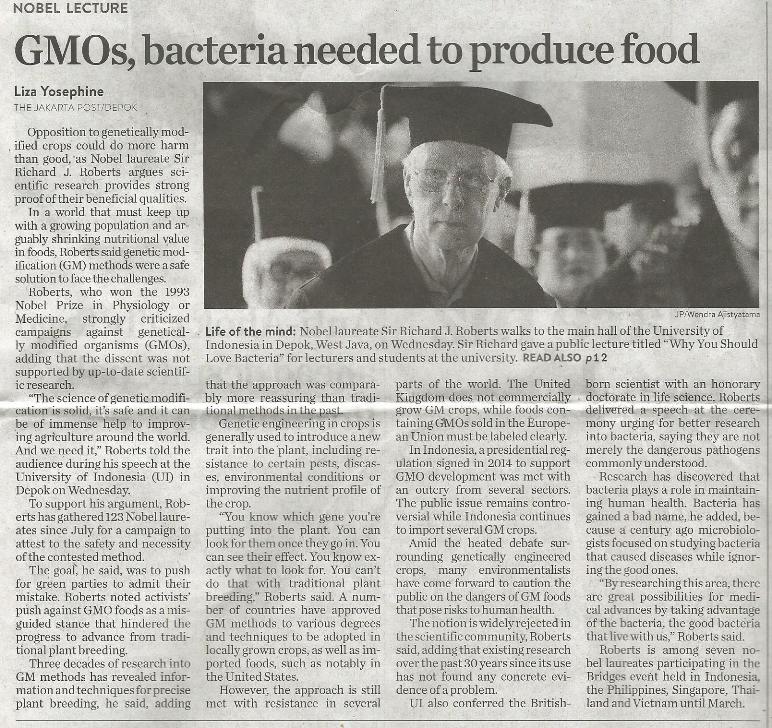|
| |
 |
|
GMOs, bacteria needed to produce food
|
Jakarta Post
February 9, 2017

Opposition to genetically modified crops could do more harm than good, as Nobel Laureate Sir Richard J. Roberts argues scientific research provides strong proof of their beneficial qualities.
In a world that must keep up with a growing population and arguably shrinking nutritional value in foods, Roberts said genetic modification (GM) methods were a safe solution to face the challenges.
Roberts, who won the 1993 Nobel in Physiology or Medicine, strongly criticized campaigns against genetically modified organisms (GMOs), adding that the dissent was not supported by up-to-date scientific research.
"The science of genetic modification is solid, it's safe and it can be of immense help to improve agriculture around the world. And we need it," Roberts told the audience during his speech at the University of Indonesia (UI) in Deop on Wednesday.
To support his argument, Roberts has gathered 123 Nobel laureates since July for a campaign to attest tp the safety and necessity of the contested method.
The goal, he said, was to push for green parties to admit their mistake. Roberts noted activists' push against GMO foods as a misguided stance that hindered the progress to advance from traditional plant breeding.
Three decades into the research of GM methods have revealed information and techniques for precide plant breeding, he said, adding that the approach was comparably more reassuring than traditional methods in the past.
Genetic engineering in crops is generally used to introduce a new trait to the plant, including resistance to certain pests diseases, environmental conditions or improving the nutrient profile of the crop.
"You know which gene you're putting into the plant. You can look for them once they got in. You can see their effect. You know exactly what to look for. You can't do that with traditional plant breeding," Roberts said. A number of countries have approved GM methods to various degrees and techniques to be adopted in locally grown crops, as well as imported foods, such as notable in the United States.
However, the approach is still met with resistance in several parts of the world. The United Kingdom does not commercially grow GM crops, while foods containing GMOs sold in the European Union must be labeled clearly.
In Indonesia, a presidential regulation, signed in 2014 to support GMO development was met with an outcry from several sectors. The public issue remains controversial while Indonesia continues to import several GM crops.
Amid the heated debate surrounding genetically engineered crops, many environmentalists have come forward to caution the public on the dangers of GMO foods that pose risks to human health.
The notion is widely rejected in the scientific community, Roberts said, adding that existing research over tha past 30 years since its use has not found any concrete evidence of a problem.
UI also conferred the British-born scientist with an honorary doctorate in life science. Roberts delivered a speech at the ceremony urging for better research into bacteria, saying they are not merely the dangerous pathogens commonly understood.
Research has discovered that bacteria plays a role in maintaining human health. Bacteria has gained a bad name, he added, because a century ago microbiologists focused on studying bacteria that caused disease while ignoring the good ones.
"By researching this area, there are great possibilities for medical advances by taking advantage of the bacteria, the good bacteria that live with us,"A Roberts said.
Roberts is among seven nobel laureates participating in the BRIDGES even held in Indonesia, the Philippines, Singapore, Thailand and Vietnam until March.
|
|
|
